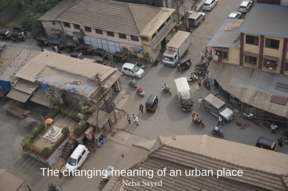Public defence in new media, MA Neha Sayed

When
Where
Event language(s)
MA Neha Sayed will defend the thesis "The Changing Meaning of an Urban Place" on 17 June 2022 at 2 p.m. in Aalto University School of Arts, Design and Architecture, Department of Media, in lecture hall A1, Otakaari 1, Espoo, and online in Zoom.
Opponent: Prof. Brendon Clark, Umeå University, Sweden
Custos: Prof. Lily Diaz-Kommonen, Aalto University School of Arts, Design and Architecture, Department of Media
The public defence will be organized via remote technology. Follow defence: https://aalto.zoom.us/j/69174067657
Zoom Quick Guide: https://www.aalto.fi/en/services/zoom-quick-guide
Thesis available for public display at: https://aaltodoc.aalto.fi/doc_public/eonly/riiputus/
Doctoral theses in the School of Arts, Design and Architecture: https://aaltodoc.aalto.fi/handle/123456789/54
Press release:
Ubiquitous technology like Internet of Things (IoT) is about to impact our everyday life, more specifically in the urban environment. We construct a meaning of place that we inhibit. This meaning is always challenged by external agencies for example urban planning departments in the government. The development planned by such agencies remains disconnected from the aspirations of the communities. This is starkly evident in the Indian scenario. Soon, this development will gain a momentum geared by the sensor driven technology like IoT. There is an undertone of control in adopting to such a tool which has kept urban citizen worried. This will change the meaning of place for us as urban dwellers.
In this research, I present an approach to study the role IoT technology may play in the changing meaning of place. The research presents a case of a traditional marketplace on the west coast of India where the trading communities are communicating their aspirations to the urban planners in unique ways. I present a design intervention of IoT technology designed and managed by the community to open up a space for dialogue in the urban development process. By deploying a community driven IoT project they keep their stake in the new meaning of place.
The research contributes to the IoT paradigm by indicating a pro-community approach for technological development. More immediately, the project is based in new media research by indicating the role of media studies in the developing understanding of IoT.
Contact information of doctoral candidate:
| neha.sayed@aalto.fi | |
| Mobile | +358-449161286 |






